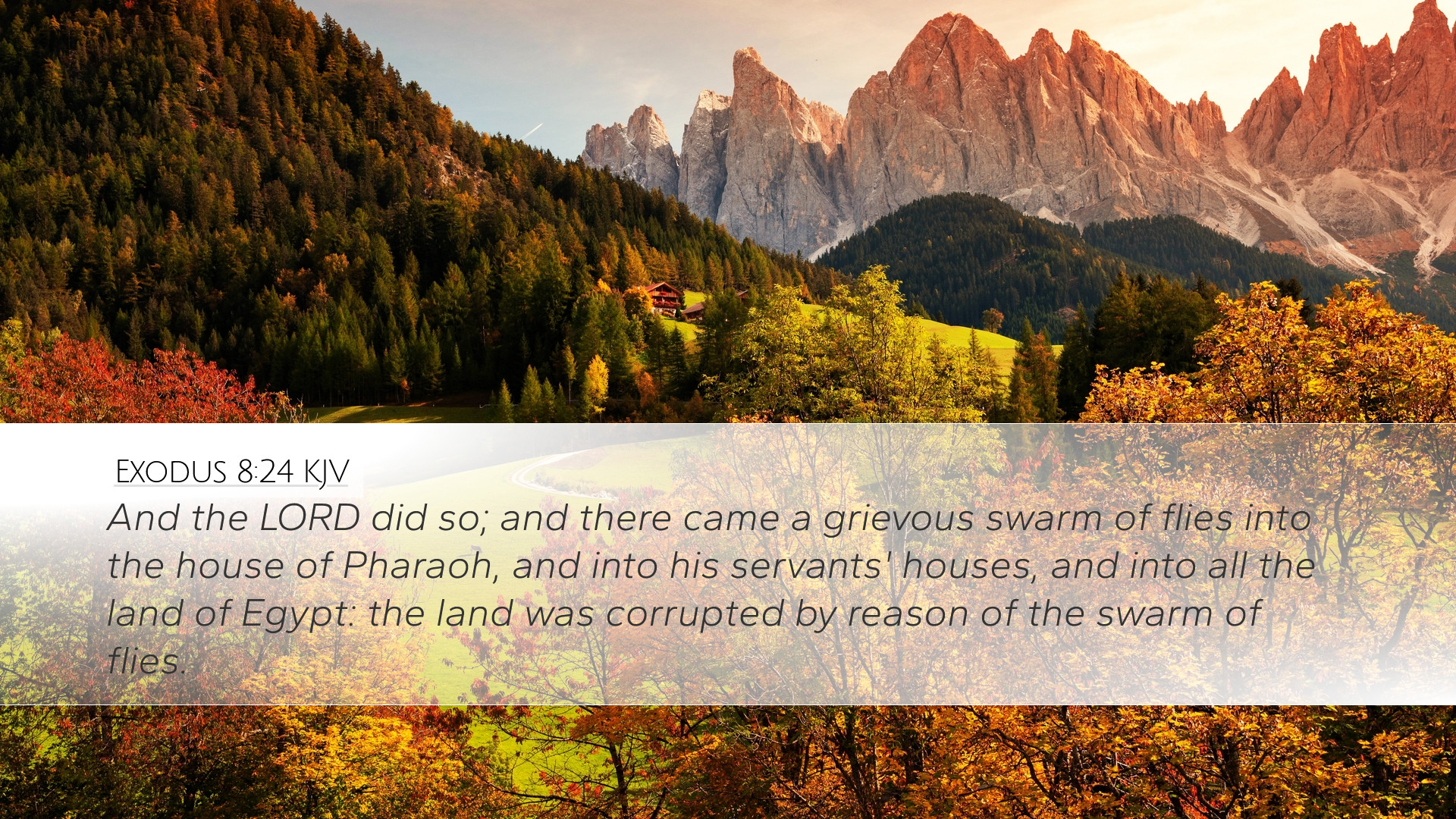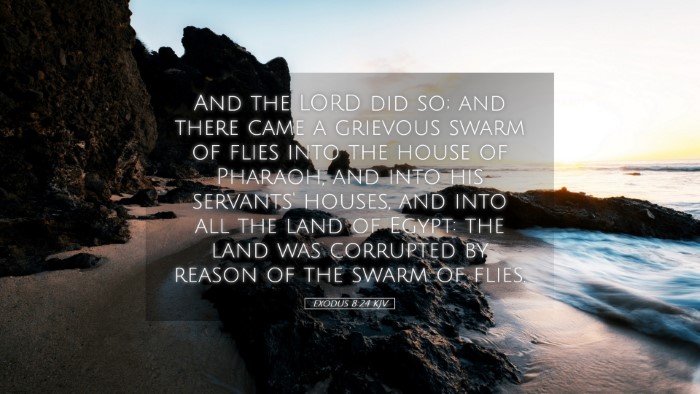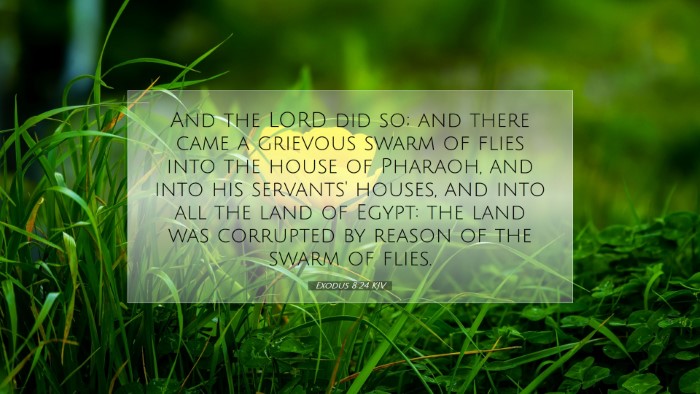Commentary on Exodus 8:24
Exodus 8:24 states: "And the LORD did so; and there came a grievous swarm of flies into the house of Pharaoh, and into his servants' houses, and into all the land of Egypt: the land was corrupted by reason of the swarm of flies."
Introduction
This verse is part of the broader narrative detailing the plagues that God inflicted upon Egypt, signifying His power and judgment against Pharaoh's rebellion. The plague of flies serves a dual purpose: it is a judgment against the Egyptian gods and a demonstration of God’s sovereignty over creation.
Contextual Background
The context of this verse lies within the account of Moses and Aaron's confrontation with Pharaoh. God had commanded Moses to deliver His people from slavery, and Pharaoh's refusal led to a series of plagues intended to compel him to relent. This particular plague of flies is significant not only for its immediacy but also for its implications regarding the spiritual battle occurring in Egypt.
Theological Insights
- Divine Judgment: According to Matthew Henry, the plague of flies represents God's judgment on Pharaoh and the Egyptians for their hardness of heart. The "grievous swarm of flies" is indicative of the severity of God’s wrath against a nation that has defied Him.
- God’s Sovereignty: Albert Barnes comments on the fact that such a specific plague—targeted not just at individuals but at the entire nation, including Pharaoh—illustrates God’s absolute sovereignty. He can wield nature to exercise His will against those who oppose Him.
- Spiritual Confrontation: Adam Clarke observes that the flies could be linked to the Egyptian gods associated with flies, presenting a direct challenge to their power. This emphasizes God’s supremacy over the false gods of Egypt and endorses the theme that He alone is worthy of reverence and worship.
Symbolism of the Swarm of Flies
The swarm of flies is more than just a natural phenomenon; it symbolizes chaos and corruption. The text indicates that "the land was corrupted", suggesting a moral and spiritual decay that reflects the state of humanity when living in rebellion against God.
- Corruption and Decay: The presence of flies is often indicative of death and decay. It alludes to the consequences of sin, which brings rot and corruption into the fabric of society. As noted by Matthew Henry, this indicates the depth of the moral degradation within Egypt.
- Physical and Spiritual Realities: Albert Barnes emphasizes that while physical ailments caused by the plagues are evident, the ultimate goal is the spiritual awakening of Pharaoh and his people. Spiritual stagnation breeds physical manifestations of disarray and dissatisfaction.
The Response of Pharaoh
In the wake of the plague, Pharaoh's reaction is critical. Though he may soften or change his position temporarily, the hardening of his heart is a recurrent theme in the narrative. This highlights the struggle between divine authority and human obstinacy.
- Hardness of Heart: Adam Clarke elucidates how each plague serves to reveal the hardness of Pharaoh's heart, which ultimately leads to greater judgment. Each subsequent affliction is not only a punishment but also a call to repentance, demonstrating God’s long-suffering nature.
- Repentance and Rejection: As Pharaoh oscillates between repentance and rejection, the narrative showcases the human tendency to respond to divine warnings with temporal remorse rather than genuine repentance. This theme is vital for understanding the nature of sin and human agency in relation to God’s sovereignty.
Lessons and Applications
The account of the flies in Exodus 8:24 serves many didactic purposes for modern readers, particularly for pastors, students, and theologians who seek to understand God's governance and our response.
- Understanding Judgment: The concept of divine judgment is vital, reminding us that God's justice is not capricious but a necessary response to sin. There is a call here to examine our lives in light of God’s holiness.
- Awareness of Corruption: The corruption in the land serves as a warning. God’s judgments often serve to reveal our spiritual condition. The church today must heed the warnings of spiritual decay and worldly influences.
- The Nature of God’s Sovereignty: This scripture acts as an affirmation of God’s sovereignty—the reality that He controls the universe and is constantly working toward the fulfillments of His purposes, even amid human opposition.
- Repentance and Redemption: Lastly, this passage calls for true repentance. Instead of simply seeking relief from affliction, we are encouraged to pursue genuine reconciliation with God.
Conclusion
Exodus 8:24 portrays a significant moment in the unfolding narrative of redemption, pointing not only to the historical context of the Israelites' liberation but to deeper theological truths that resonate across generations. The challenges posed by Pharaoh and the ensuing plagues serve as a reminder of God's relentless pursuit of His people, His justice, and His invitation to repentance.
Thus, as we reflect on the implications of the swarm of flies, may we cultivate hearts attuned to God’s voice, ready for His sovereign work, and sensitive to the corrupting influences of sin both in our lives and in the world around us.


